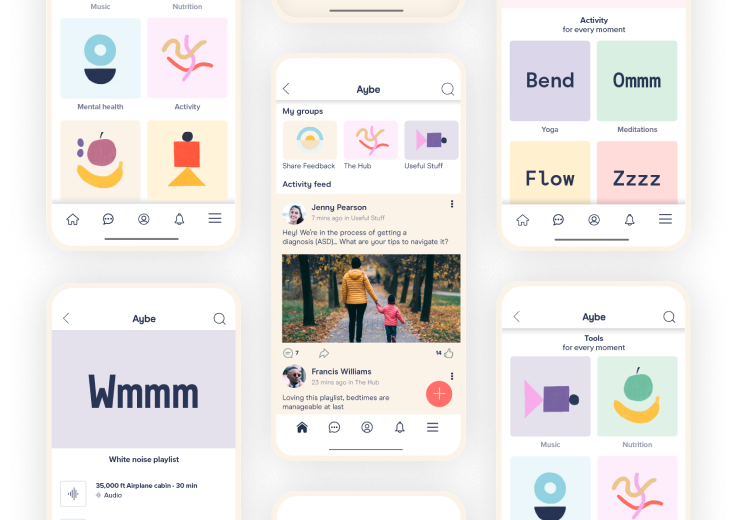Glossary

ADHD (Attention deficit hyperactivity disorder)
ADHD is a neurodevelopmental condition that is characterised as inattentiveness, hyperactivity or impulsiveness. This neurodiverse condition is highly stigmatised and largely misunderstood, with hyperactivity often manifesting as internal restlessness especially in adults.
Autism or ASC/ ASD (Autistic Spectrum Condition/ Autistic Spectrum Disorder)
The broader continuum of Autism is usually referred to as Autistic Spectrum Disorder (ASD), or Autistic Spectrum Condition (ASC). The latter is used more frequently now as it is less stigmatising than being labelled as having a disorder. It is a lifelong developmental disability, which affects how a person communicates, relates to other people and makes sense of the world around them.
CAMHS (Child and Adolescent Mental Health Services)
CAMHS is the name for the NHS services that assess and treat young people with emotional, behavioural or mental health difficulties.
CBT (Cognitive Behavioural Therapy)
Cognitive behavioural therapy (CBT) is a talking therapy that can help people manage problems through changing the way they think and behave. It is commonly used to treat anxiety and depression, but can be useful for other mental and physical health problems.
CYPMHS (Children and young people’s mental health services)
CYPMHS is used as a term for all services that work with children and young people who have difficulties with their mental health or wellbeing. This is a new term and it includes all the services that might be available to help you as well as CAMHS.
DBT (Dialectical Behavioural Therapy)
DBT is a modified type of CBT that is especially adapted for people who feel emotions intensely. Originally intended to treat borderline personality disorder (BPD), it has been adapted to help people with emotional dysregulation, eating disorders, substance use disorders and post-traumatic stress disorder (PTSD).
DLD (Developmental Language Disorder)
DLD manifests as significant difficulties in using and understanding spoken languages, which can make speaking and listening challenging.
Dyscalculia
Dyscalculia is a specific and persistent difficulty in understanding numbers which makes it hard to do any tasks involving mathematics. The challenges can come across as being unexpected when referring to age, education levels, experiences and abilities.
Dysgraphia
Dysgraphia is a condition that affects the ability to recognise and decipher written words, and the relationship between letter forms and the sounds they make.This can make writing, spelling and forming words challenging.
Dyslexia
Dyslexia is a learning difference which affects reading, writing, information processing, working memory, and organisation skills. It is best viewed as a continuum, with co-occurring difficulties in language, motor coordination, mental calculation, concentration and personal organisation, but these traits by themselves are indicative of dyslexia.
Dyspraxia (or Developmental Coordination Disorder/ DCD)
Dyspraxia or DCD is a neurodevelopmental condition which impacts coordination of physical movements such as hopping, jumping, running, catching or kicking a ball or fine motor skills which impacts handwriting and operating small stationeries and items in daily life.
Ed Psych (Educational Psychologist)
Educational psychologists tackle challenges such as learning difficulties, social and emotional problems, issues around disability as well as more complex developmental disorders.
EFT (Emotional Freedom Techniques)
EFT is a technique combining psychotherapy and acupressure, bringing together elements of exposure, cognitive therapy and somatic stimulation. Commonly known as ‘Tapping’, using fingertips to stimulate energy points on the body, EFT offers healing from physical and emotional pain.
EHCP (Education and Health Care Plan)
EHCP is a document which sets out the education, healthcare and social care needs of a child or young person for whom extra support is needed in school, beyond that which the school can provide. It was formerly known as a ‘statement of special educational needs’.
EHCA [Education, Health and Care (“EHC”) needs assessment]
EHCA, Education, Health and Care (“EHC”) needs assessment is an assessment of the education, health care and social care needs of the child or young person.
ELSA (Emotional Literacy Support Assistant)
An ELSA is a trained, school based learning support assistant. Their role is to support the emotional wellbeing of pupils. They are trained by a team of Educational Psychologists and receive ongoing group supervision.
Neurodivergence
The state of being neurodivergent, can be largely or entirely genetic and innate, or it can be largely or entirely produced by brain-altering experience, or some combination of the two.
Neurodivergent
A person who has a brain difference and diverse ways of thinking, learning, processing and behaving, which deviates from the majority of the population as a result of innate or acquired neurodivergence.
Neurodiverse
A group of people is neurodiverse if one or more members of the group differ substantially from other members, in terms of their neurocognitive functioning.
Neurodiversity
Neurodiversity is the diversity of human minds, the infinite variation in neurocognitive functioning within our species.
Neurotype
A neurotype is the name given to a form of brain wiring. The so-called “normal” neurotype is referred to as Neurotypical (abbreviated NT) and is what we once thought of as being the most common, or “typical” form of wiring, hence the name.
NICE (National Institute for Health and Care Excellence)
NICE produces evidence-based guidance and advice for health, public health and social care practitioners. NICE’s aim is to improve outcomes for people using the NHS and other public health and social care services.
OT (Occupational Therapist)
Occupational therapists help people of all ages to overcome any permanent loss or lack of physical, sensory, mental or communication function. Occupational therapy focuses on developing, recovering, or maintaining the daily living and working skills of people with physical, mental, or cognitive impairments.
SLT (Speech and Language Therapist)
Speech and language therapists help adults with speech, language, voice, communication and swallowing difficulties.
SPA (Single Point of Access)
The Single Point of Access (SPA) is a team of clinicians who review your emotional and mental health concerns and help establish the best way to support you.
Tourette’s syndrome
Tourette’s syndrome is a condition that causes a person to make involuntary sounds and movements called tics. It usually starts during childhood, but the tics and other symptoms usually improve after several years and sometimes go away completely.
Important note: This Glossary of neurodiversity terms is a growing list. If you come across any terms that you wish to clarify and need more explanation on, let us know in the comments section or post in the community groups.
Join the Community
Download the app to access more specialist advice, community support and wellbeing tools.
Join today as a Contributor member to gain free* access!
Download now
*Free access, in return for contributing to Aybe on a weekly basis, for example by commenting, liking, responding to feedback requests. See Terms & Conditions.

